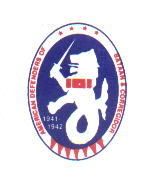
Posted on 05/06/2008 7:52:20 AM PDT by VR-21
On this date in 1942, General Wainwright surrendered the American forces on Corregidor. Those men (my father among them), and a small number of nurses began their captivity at the hands of the Japanese army.
My respects to the Americans and Filipinos who were The Defenders of Bataan and Corregidor.

Naked pyramids vs death marches and starvation by forced slave labor...
How did that verse go?
“No mom, no pop, no Uncle Sam,
We’re the battling bastards of Bataan.”
God bless’em.

In my personal museum, I have fragmants of artillery round fuses from the Island.
I visited and studied the battlefield there and across the water on Bataan. Our troops both US Army and the Philippines stood with their backs to the wall.
My grandfather’s brother was caught, too. Bataan, Camp O’Donnell, Cabanatuan, slave labor in the coal mines on the Japanese home islands, the whole nine yards. Rot in hell, Dugout Doug.
This was written by Frank Hewlett, 1942. It reflected the bitterness the men of the 31st Infantry felt when they realized there was no help coming.

Thank you!
I remember finding a book about Coregidor in my father’s library when I was about 11 or 12. I started reading it, but was too horrified to finish. Unbelievable brutality.
Salute to all our war heroes...
I visited Corregidor too, when I was in the Navy. I sent my father a picture of myself standing at what remained of Battery Cheney, where he served as part of the 60th Coastal Artillery (AA). I’m sure he wasn’t sure that he’d have any offspring at that time, much less one speaking english.
My grandfather was 60 when he survived the Death March. I can’t imagine how great a man he was.
In case anyone is interested, “So Proudly We Hail”, a 1943 film about Army nurses stranded on Corregidor, was released on dvd for the first time last year. It’s a very good film, and nice to not be at the whim of TCM scheduling.
Your picture reminds me of the surrender on the Missouri. It’s almost never shown in the footage one sees of that event, but when the Japanese signed the document, they were required to use two pens. Immediately after the signatures were made Mac called Generals Wainwright and Percival (commander of the British forces at Singapore) to the table and gave them each one of those pens. I guess is’s not considered diplomatic to show that portion of that film.
I agree (as is almost anything with Claudette Colbert).
One of the POW books I read had a story where the prisoners were allowed to send censored mail back home, telling about how great they were treated by the Japs. One guy wrote "I was 160 pounds when I was captured, now I weigh almost as much as Jimmy."
"Jimmy" was a nephew who weighed 90 pounds.
Many of these POWs died at an early age because the abuse they went through crippled their bodies and immune systems.
As did mine! My father was for the most part very close-mouthed about the war, and particularly his captivity. Like yours though, he was very respectful and grateful to the Filipinos. They risked their lives to aid the Americans, and my father credits them with saving his life by smuggling a few cans of condensed milk to him when he was ill and had nothing to eat or drink for days while enroute from Bilibid prison to Cabanatuan 3. The story of the courage of the Filipinos then is yet another sadly untold story of that time.
Funny, I was just reading about his liberation last night not even making the connection that today would be May 6th, the day he surrendered.
For many those were the darkest days of the war. Sure, Pearl Harbor was devastating but, from what I’ve heard from my family who lived through it, the fall of the PI with absolutely no way for us to rescue our troops was a real psychological blow...and they didn’t even know what kind of treatment they were actually receiving but did know it wouldn’t be good. I’ve stood on Surrender Deck of the Mighty Mo now docked in Pearl and it was a very moving experience as I recalled in my minds eye the films of the surrender and the solemn voice of General McArthur as he directed the formalities in Tokyo bay. And when he called Wainright up you could see the man was only a shadow of his former self. It was the most touching moment of the ceremony and not only fitting but in no small part, a gesture to the Japanese (who had sent low level officials, an intended slight on their part I am convinced) that we, the American and Philipino people had taken all the Japanese could dish out and here, in the emodiment of that attitude stood General Wainright, accepting their unconditional surrender. Some say it was just the natural courage of the “greatest” generation and can’t argue with that. I would only add that it carries on from generation to generation and is an inherent trait of a free people and those that love freedom so much they’re willing to endure any hardship to defend it.
Disclaimer: Opinions posted on Free Republic are those of the individual posters and do not necessarily represent the opinion of Free Republic or its management. All materials posted herein are protected by copyright law and the exemption for fair use of copyrighted works.